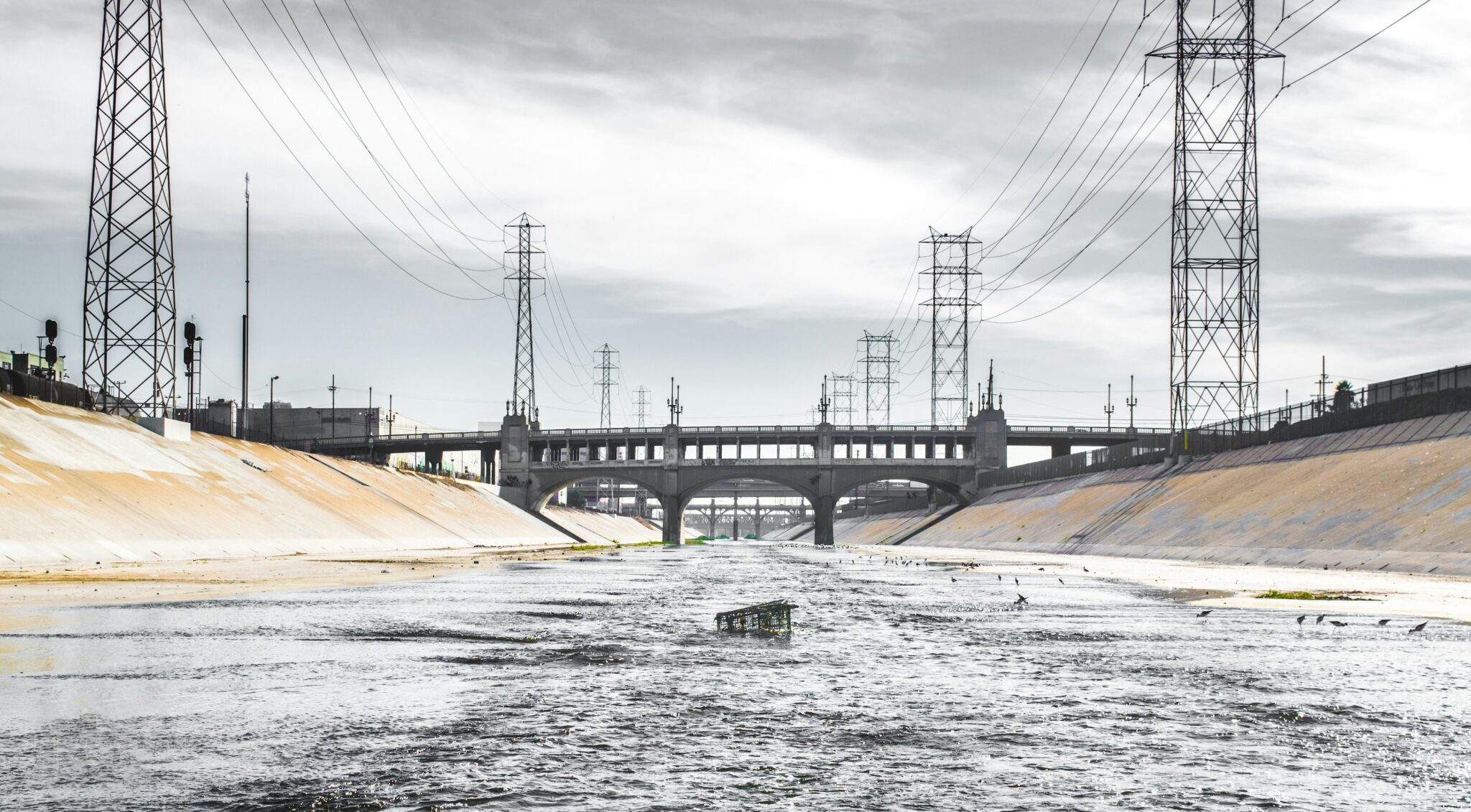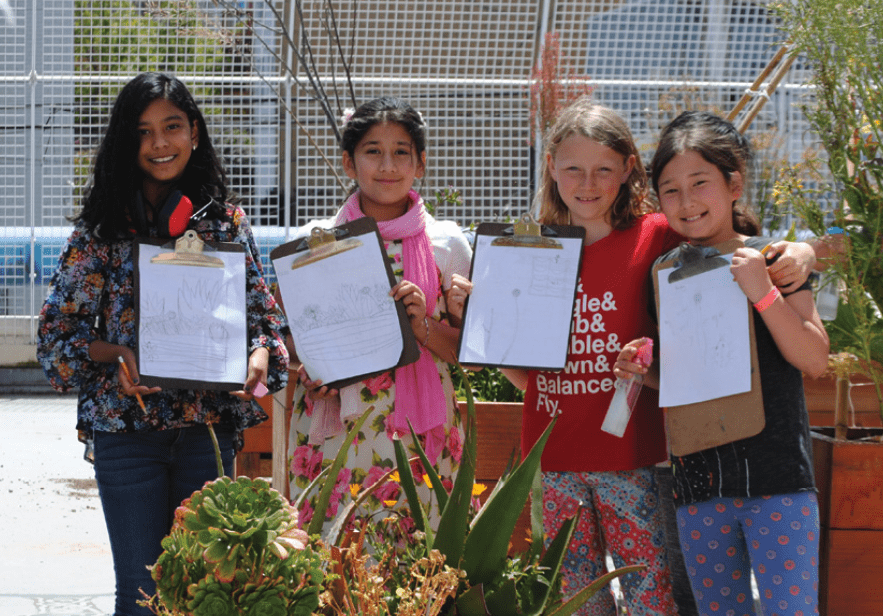Looking back now, it’s hard to believe that CAELI’s focus on equity was not always inevitable. When CAELI emerged as a statewide project rooted in a 2015 Blueprint for Environmental Literacy, equity was not a core tenet. In a recent interview, Candice Dickens-Russell, currently the CEO of Friends of the Los Angeles River, reflected on the early development of the blueprint in 2015, how designing for the margins expands support for all, and reflected on her learnings as CAELI’s commitment to equity has grown over time.
In the Room Where It Happened
Candice was quick to emphasize the potential paths that the Blueprint and CAELI (formerly the Environmental Literacy Steering Committee (ELSC)) could have taken. The Blueprint could “have sat on this lovely little cabinet that Tom Torlakson, the superintendent of public instruction at the time, had in his office,” meaning it would have been occasionally dusted off and mostly overlooked.
Luckily, Ten Strands was committed to putting time and resources towards building an implementation committee for the Blueprint. In 2015, Candice was selected as one of forty seven people statewide to serve on the Blueprint for Environmental Literacy Task Force for the state. Over time, the task force grew into a steering committee and then into the California Environmental Literacy Initiative. Candice stuck with this work, and has continued to serve on the California Environmental Literacy Initiative (CAELI) as one of the Equity Innovation Hub Co-Leads.
Throughout this transformation from Blueprint Task Force to CAELI, it became apparent that equity should be an important theme. A dedicated committee emerged to delve into how equity should be integrated. The resulting Theory of Action emphasized inclusivity and fairness in scaling up environmental literacy for all students and in students gaining access to outdoor education experiences. Equity became a core tenet for CAELI in 2019. Since then, CAELI has led with the philosophy that “equity is both a column and a row.” The aim is to integrate equity into every aspect of CAELI’s work.
Candice articulated the transformative approach that CAELI has taken, characterized by a thoughtful and concerted effort that brings together diverse teams and coalitions.
CAELI’s Evolution of Equity
Since the beginning, Ten Strands invested in creating an implementation committee that represented stakeholders from all levels including district professionals, community-based organizations, educators, policymakers, former superintendents, and even students. Nine years later, the result is a sophisticated and thoughtful approach that aims to unite various stakeholders in a collective pursuit to advance environmental education across California schools.
“I would describe it as like a much more sophisticated, thoughtful effort to support work that’s been going on forever and ever.” – Candice Dickens-Russell
Candice emphasized that equity is not an afterthought but an integral aspect woven into every decision and practice. Historically, resource allocation and other decisions relied heavily on the school’s readiness for the investment. CAELI challenges the old paradigm where readiness often favors those with existing resources, overlooking the pressing needs and historical deficits in other communities. CAELI’s approach embraces the essence of equity by asking where interventions are most needed and actively working to address past exclusions. The focus is not on uniform distribution but on understanding and rectifying historical disparities.
“Learning that race and racism play a role in shaping the environment was a revelation to me. If someone had asked me in high school if race played a role in the environment, I would have been like, no. That’s ridiculous. That’s weird. That has nothing to do with it. But learning that it does and seeing it in play really, really kind of came to me.” – Candice Dickens-Russell
The importance of equity work only accelerated in 2020. Personally, the murder of George Floyd in May 2020 caused Candice to rethink her career. She chose to start consulting full-time on equity strategic planning for environmental organizations. The demand for her expertise grew as well as CAELI’s knowledge base. “My job is to show people where the opportunities are to grow and to do better. And so we started doing that.”
In 2020, Candice helped steer CAELI to prioritize workshops and resources for growth and support in the face of systemic issues. CAELI emphasizes the need for conversation that extends beyond dedicated equity team meetings. Everyone must ponder the equity implications of their work. This means consistently asking questions like: How is our work excluding someone? In what ways are we missing the mark and not reaching everyone? While recognizing the challenge of these questions, Candice stressed the significance of seeking answers. If unsure, she encourages people to reach out, whether to her directly or to the right person who can provide insights. Perfection is not the goal, the emphasis lies on continuously asking the right questions and striving for improvement in addressing the diverse needs of California’s six million children in their education.
Designing for the Margins
To ensure equity remains a central focus for CAELI, Candice emphasized the approach of designing for the margins, a philosophy that focuses on creating solutions for those who have historically been excluded or lacked opportunities.
As the current CEO of the Friends of the LA River, Candice has found creative solutions to ensure their programs are designed for the margins. Their annual river cleanup event saw many participants travel from wealthier neighborhoods on the westside, but she noticed that the local community living by the river wasn’t joining. To address this, the organization decided to engage with neighbors, encouraging them to join and be a part of the event. It became a win-win as those in the local community felt welcomed and excited to come, while the volunteers from the westside still came out to volunteer.
“When you design for the margins, the middle always takes care of itself. We are not excluding the middle when we design for the margins. We are uplifting these parts that haven’t been served before, and it creates a more level, more normal playing field.” – Candice Dickens-Russell
This approach, as implemented by CAELI, is rooted in addressing historical exclusion, recognizing needs, and rectifying past injustices rather than focusing on readiness or previous engagement.
Building Equity into Practice
Candice often reminds CAELI members that “equity is both a column and a row.” What that means in practice is recognizing the need to have an equity hub within CAELI, while also ensuring that equity is not a separate entity but is also a practice that is integrated into all of the other CAELI Innovation Hubs and working groups. This approach allows the equity team to engage with other teams, offering support, workshops, and resources.
The Equity Hub has many initiatives coming up to support CAELI members. Next month, the Equity Guidebook will be released, featuring a glossary and best practices for CAELI members to use and apply to their CAELI projects and programs. Candice and other team members will be sharing the findings in future webinars as well.
When asked how people in any organization can begin putting equity into practices for themselves and their teams, Candice encourages discussions. Many people want informational webinars and formal training, but sometimes starting more conversationally with discussions through book clubs, film viewings, and article discussions can help propel the equity conversation forward in any organization. The goal is to keep equity at the forefront of the organization and to let folks know that equity is an ongoing process and conversation.
About Candice Dickens-Russell
Candice Dickens-Russell is the President & CEO of Friends of the LA River and a passionate leader in sustainability, environmental literacy, and environmental justice. With nearly 20 years of experience in the non-profit environmental sector, Candice has worked with, school districts, government agencies, utilities, and municipalities to develop and deliver high quality sustainability, environmental education, and community engagement projects. An equity thought leader with a passion for environmental justice, Candice has used her background in social justice to lead environmental organizations in equity strategic planning and organizational development. She is dedicated to sustainability, equity, and justice in all she does.
Learn more: https://folar.org/








